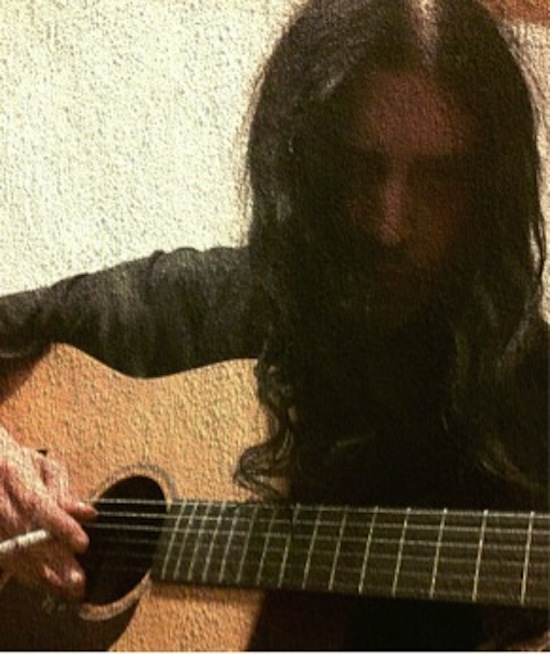For over a decade, Scott Conner was one of the most celebrated underground artists to emerge from the US Black Metal scene that emerged at the start of the century. As Xasthur, he was one of the greatest exponents of the genre, at first working in total isolation offering up extraordinary full-length albums like Telepathic With The Deceased and A Gate Through Bloodstained Mirrors before moving into a series of extensive collaborative releases. The high watermark of this phase were undoubtedly his remarkable contributions to SunnO)))’s Black One project in 2005 and his incursion into the live arena with SunnO))) and Earth on their now legendary 2006 European tour. After later releases on Hydra Head and a final epitaph entitled Portal of Sorrow, Conner called a halt to Xasthur in 2011, and for many seemed to disappear. His withdrawal actually took the form of an entirely new acoustic-based musical journey, which bore its first fruit in 2012 with the release of Other Worlds Of The Mind. Conner’s work under the name Nocturnal Poisoning is a return to first principles: elegantly constructed instrumental guitar pieces that demonstrate many of the same beguiling qualities that were so evident throughout his Xasthur output, infused with the ghost spirit of traditional country/folk sources that is genuinely surprising and refreshing. With a new album out (A Misleading Beauty) and another due out this year, we speak to Scott Conner about the new life he has carved out for himself as Nocturnal Poisoning as well as the incarnation he has resolutely left behind.
When did you take the decision to take the path towards a more acoustic-based music?
Scott Conner: Well, about five or six years ago, I borrowed an acoustic guitar for a while and started playing it a lot, I got the hang of it pretty quick because I also had the hang of it for a little while before I ever started playing metal, so it came back to me I think. Anyway, the better I got at it and the more sick and tired I got with what I was doing previously is when it started taking shape. It happened sort of fast but it didn’t happen overnight.
Was it clear from the start that you wanted to take the name Nocturnal Poisoning forward as your newest incarnation?
SC: No, I was thinking of other names to use, but a lot of them sounded too casual or forgettable, so I figured I’d leave somewhat of a calling card and name the band after an old song.
Where did the "doomgrass", the term that has been coined to describe your music come from?
SC: Well, I continued learning a lot from bluegrass picking and riffs, or at least it really motivates me to play, but I change some of the happier chords and mix them into ones that are darker that I make up, so it’s a mixture of doom in the sombre, dark and discordant way, mixed with bluegrass or country picking and chords.
How do you reflect on the career you had under the name Xasthur? Are there any particular aspects of those years that you feel are still of interest/relevance for your current work?
SC: I try to believe that, somehow, Xasthur led me to where I am now and what I’m doing now, or it’s that what I was doing desperately needed a change, it gave me a need for something else. Sometimes I can be inspired or influenced by things I don’t like as much as things I do.
What were the reactions of those you’d previously worked closely with – labels, other musicians, even fans – to your decision to pursue another musical avenue away from Xasthur?
SC: There was pretty much no reaction; I got the silent treatment from a lot of people. A lot of those people showed me that they’re not as ‘open minded’ as they pretended to be, there was no interest because they can’t see making a dollar off NP like they do black metal, it’s not trendy like that. Fans, or music listeners I should say, they have tried to give it a chance, I have to give them credit, they’ve been more open minded than I expected. Some people who usually or only listen to black metal almost like it, some people don’t.
What has given you the most amount of satisfaction with regard to your new way of working?
SC: I can just hear what I’m doing a lot better, it’s clearer and every piece always seems to fit with the other when making songs, I enjoy it a lot. In the past, doing that black metal stuff, it was like I was expected to paint a bleak yet colourful picture over and over again, but only by using a gray pencil. Now with more colours, I can set up the colours, even the bleak ones, much better now.
Are there any guitar players that you look to for inspiration or simply just enjoy listening to? I only ask as I don’t think I’ve ever asked you when you first began to play guitar, or if there was anyone who inspired you.
SC: Well, these days, some guitar players like Jack Rose, Ben Chasney and Tim Buckley really make me want to play, and are inspiring. There are others, but those are the ones I will mention for now.
Now that some years have passed, how do you reflect on your career as Xasthur? What do you consider to have been the successes and also the failures of that incarnation?
SC: I don’t really reflect on it very much, it was something that was exciting to me for maybe half of the years I was doing it, which really wasn’t enough to continue with it. Near the end, it seemed like I wasn’t able to manage the happenings of the band properly anymore, I kind of let it slip away.
Have you changed your outlook to performing live since your work began as Nocturnal Poisoning? I think your new work come across as very immediate in a live environment.
SC: I’ve been more open to the idea, but on the other hand, it seems like such a hassle, it was always hard finding the right people years ago and now with this new project, it still is. I seem to know metal people still and those kinds of people just do not play music like this, even if they want to. I also don’t seem to understand the motives of a lot of other musicians.
I saw that someone has introduced you to Townes Van Zandt; who else have you been listening to recently? Have your listening habits changed as much as your own creative energies?
SC: Yes, I’m not some expert die-hard when it comes to Townes but I like what he does and a lot of similar music to that, it sort of gives you a different sound to say different things with.
Can you tell me about both of the albums you’ve released so far: how you’ve developed from Other Worlds Of The Mind to A Misleading Reality, what your intentions were for each album and how you feel about the results?
SC: Well, the satisfaction that I have with the second CD, A Misleading Reality is still holding up pretty much to this day, even though it’s been out for several months. Other Worlds Of The Mind, was where I was basically finding my way and beginning. I think it’s somewhere between a demo and a real album, I do like most of the songs still, but I’ve tried different tempos and tunings that work a lot better since.
Are you working on anything for release in 2014?
SC: Yes, I am working on a third CD for 2014, called Doomgrass which is a mixture of acoustic doom and bluegrass picking and chords, or maybe I should say, bluegrass turned into doom on and off in each song. I seem to have reached a fork in the road in terms of ‘how’ it will come out and how it’ll be available. I can’t stand still or go backwards with what I’m doing, I’ve done about as much as I can and so far, there have been a couple false alarms with bigger labels that could help with the distribution, but if there is no help, then I will press the CD myself again if I have to, and, you know, stand still or go backwards even.



